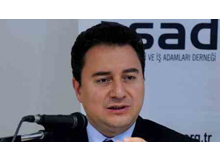| |
|
 |
Deputy Prime Minister Ali Babacan, who oversees the government´s economic policies, said on Friday that officials from the International Monetary Fund (IMF) and the World Bank (WB) have asked the government to share its experiences in economy management with countries that face serious economic challenges.
|
The minister was speaking at a G-20 working meeting late on Friday in Washington, D.C., where he said the IMF and WB expect Turkey to share its experiences of implementing economic measures “because a good model can be a more effective way to teach economies how to cope with crises than written prescriptions and reports released by international organizations."
Turkey's economy expanded by 8.5 percent last year, becoming one of the fastest growing economies in Europe and within the larger Organization for Economic Cooperation and Development (OECD).
The minister said the world expected the US to take more radical measures in 2013, including cutting its budget deficit and focusing on structural reforms. "If these expectations are not met, we could face a serious challenge, but I do not think the US will make that mistake," he said.
Speaking to reporters in Washington on Sunday, Babacan said the government expected that some measures the government had already taken to keep possible problems in the markets at bay will start to pay off in 2013. “This year will see a relatively slower gross domestic product [GDP] growth, but we have faith Turkey will maintain stability in its economy. … We have a number of diversified instruments with which to intervene in markets in the event of a problem,” he argued.
Babacan pointed out that the government expects GDP to grow by an average of 4 percent this year and doesn't rule out the possibility of risks lingering in the markets. “High inflation and the current account deficit [CAD] remain serious risks. Some foreign observers may be downplaying Turkish growth this year due to these two problems, but I guess we know how to put our home in order better than international institutions,” he asserted. Turkey's annualized consumer price index (CPI) stood at 10.43 percent in March. Turkish Central Bank's latest twice-monthly Survey of Expectations, published last week, raised Turkey's annual CAD expectation to as high as $65 billion. In recent years, the Turkish government has taken bold steps to minimize the role of international institutions in management of Turkey's economy. Turkey ended its standby agreement with the IMF in early 2010 and is expected to pay back all of its debt to the IMF by 2015.
Babacan met with World Bank President Robert Zoellick on Friday and had a separate meeting with US Treasury Secretary Timothy Geithner on Saturday.
|
Source : todayszaman.com
Hit : 998
|
|
|
|




